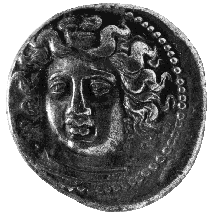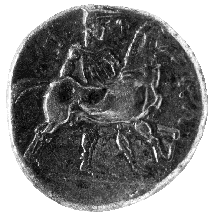



(29) Larissa, Thessaly (Greece) - AR drachm, c. 340 B.C., 5.93
g. (inv. 91.063).
Obverse: Facing head of nymph Larissa.
Reverse: Horse r. with youth mounting; ![]() : Larissa.
: Larissa.
Provenance: Coin Galleries, 1971.
Bibliography: C.M. Kraay, Archaic and Classical Greek
Coins (Berkeley and Los Angeles 1976) 115-117.
When Larissa ceased minting the federal coins it shared with other Thessalian
towns and adopted its own coinage in the late fifth century B.C., it chose
local types for its coins. The obverse depicted the local fountain nymph
Larissa, for whom the town was named, probably inspired by the famous coins
of Kimon depicting the Syracusan nymph Arethusa (see nos. 17,
28).
The reverse depicted a horse in various poses. The horse was an appropriate
symbol of Thessaly, a land of plains which was well-known for its horses.
The male figure accompanying the horse on this coin appears to be ready
to mount. He should perhaps be seen as the eponymous hero of the Thessalians,
Thessalos, who is probably also to be identified on many of the earlier,
federal coins of Thessaly.
P.A.M.



All contents copyright (c) 1996.
Lawrence University
All rights reserved.